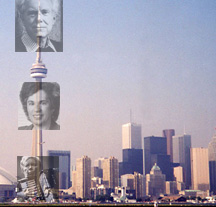Friday, March 25, 2005
You Can't Have It All

Friends or Enemies? 
Zaimont’s piece won this competition in 1990, fifteen years ago. Friends and Enemies of New Music is certainly a worthy ensemble, but their performance history hardly bends toward downtown music. Here's a list of performed composers from their ensemble bio: Alla Borzova, Artur Kampela, Elliott Carter, David Del Tredici, Charles Dodge, Leon Kirchner, Thea Musgrave, Shulamit Ran, and Ned Rorem. Daniel Bernard Roumain is on the list as well, and he's the only one who might even remotely be considered downtown, but that's a whole other discussion...
Zaimont's anecdote is exemplary of what true members of the downtown music community are so tired of: People from outside the community trying to impose their outsider definition onto the community. For me, these discussions are not about whether one style is better or worse than the other, but rather more about appropriation. Just because someone is influenced by downtown music doesn’t automatically make them a “downtown” composer. Zaimont is a great composer, but I seriously doubt that her music’s proposed uptown/downtown duality would be confirmed by a “panel” of genuine downtown composers/performers. I think it should go without saying that panels and composer competitions are pretty foreign to the downtown music scene, and I would be curious to know who was on the so-called downtown judging panel.
Certainly, in the 70s the downtown scene was extremely and uniformly different from the uptown scene, and the distinctions were much easier to make. Presently, the influence of early downtown music can sometimes be heard in uptown circles. That may be what tends to make the distinctions undesirable or irrelevant for some people.
However, there are still composers who, without incorporating uptown ideals, espouse and evolve a hardcore downtown musical aesthetic -- amplified instruments and vocals, ambient music, extreme repitition, genuine experimentation, disinterest in western ideas about classical form/drama, writing in a genuinely pop-influenced style rather than making concert music that “refers” to popular music, etc. -- and who operate with a downtown philosophy -- alternative production values and audience-building techniques, idiosyncratic performance-practice, venues, and other extra-musical qualities.
These composers are hardly ever embraced by panels, foundations, musical institutions, or academic institutions, not to mention the Pulitzer people… It is, therefore, important for them to have an identity and community where they can find support. This is a big reason why, for me, the downtown/uptown distinction is (still) important and legitimate.
posted by Corey Dargel
12:06 PM
|




